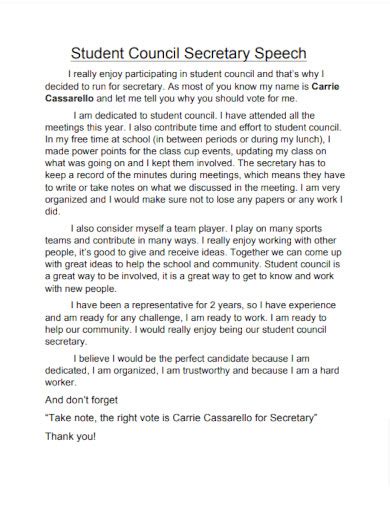Student councils are essential platforms for students to express their ideas, advocate for their interests, and make a meaningful impact within their schools. Effective speeches are crucial for student council members to articulate their visions, inspire their peers, and mobilize support for their initiatives. This article provides a comprehensive guide to crafting and delivering compelling speech examples for student council that will resonate with your audience and drive positive change.

Crafting Powerful Student Council Speeches
Effective student council speeches should adhere to the following principles:
1. Clarity and Conciseness: Structure your speech logically, with a clear introduction, body, and conclusion. Use concise language and avoid rambling or unnecessary details.
2. Relevance and Passion: Choose a topic that is relevant to your audience and that you are genuinely passionate about. This will make your speech more engaging and persuasive.
3. Evidence-Based Support: Back up your claims with credible evidence from research, statistics, or personal experiences. This will add weight to your arguments.
4. Call to Action: End your speech with a clear call to action that encourages your audience to support your initiative or take specific steps.
Speech Examples to Inspire and Empower
Here are three examples of impactful student council speeches that address common issues:
1. Speech on School Safety:
“Fellow students, we gather today to address the pressing issue of school safety. Statistics from the National Center for Education Statistics show that in 2018, over 2 million students were victims of violence or threats at school. This is an unacceptable reality that we must work together to change.
As your student council representatives, we propose a comprehensive safety plan that includes increased security measures, enhanced mental health support services, and a culture of respect and tolerance. We urge you to support our plan and work with us to create a safe and welcoming learning environment for all.”
2. Speech on Mental Health Awareness:
“Good morning, students and faculty. Mental health is an integral aspect of overall well-being that often goes underacknowledged. According to the Substance Abuse and Mental Health Services Administration (SAMHSA), one in five youth aged 13-18 experiences a mental health condition.
We, your student council, believe that it is crucial to create a supportive and stigma-free environment where students feel comfortable seeking help. We propose a peer-to-peer counseling program, increased access to mental health professionals, and awareness campaigns to educate our community about mental health. Let us prioritize the mental well-being of our students and ensure that everyone has access to the support they need.”
3. Speech on Student Voice:
“Esteemed student body, the power of student voice should not be underestimated. Studies by the National School Boards Association have shown that schools with active student councils have higher student engagement, leadership skills, and academic achievement.
As your student council, we are committed to amplifying your voices and advocating for your interests. We propose a student advisory board that will provide direct input to school administrators on matters that directly affect students. We urge you to participate in our student government and make your voices heard. Together, we can make a positive impact on our school and community.”
Step-by-Step Guide to Delivering Effective Speeches
1. Planning and Preparation:
– Choose a topic, conduct thorough research, and prepare an outline.
– Practice your speech multiple times to improve your fluency and confidence.
2. Delivery:
– Speak clearly, confidently, and at a pace that allows your audience to follow.
– Use body language to convey enthusiasm and engagement.
– Maintain eye contact with your audience to create a connection.
3. Active Listening:
– Pay attention to feedback from your audience and adjust your speech accordingly.
– Encourage questions and engage in respectful dialogue.
4. Follow-Up:
– Thank your audience for listening.
– Summarize key points and reiterate your call to action.
– Follow up with updates on your initiative or progress towards your goals.
Inspiring Quotes for Student Council Speeches
“The best way to predict the future is to create it.” – Abraham Lincoln
“Your voice has the power to change the world.” – Malala Yousafzai
“Don’t be afraid to stand up for what you believe in, even if you’re the only one.” – Rosa Parks
Frequently Asked Questions (FAQs)
1. How long should a student council speech be?
– The ideal length varies, but generally, speeches should range from 3 to 5 minutes.
2. How can I overcome nervousness when speaking in front of large groups?
– Practice regularly, breathe deeply, and focus on your message rather than your anxiety.
3. What should I do if I forget what I’m going to say?
– Take a moment to pause and gather your thoughts. If necessary, refer to your notes or outline.
4. How can I make my speeches more memorable?
– Use vivid language, share personal anecdotes, and engage with your audience by asking questions or inviting participation.
5. Why is it important for student council members to give effective speeches?
– Effective speeches empower student council members to advocate for their ideas, inspire their peers, and mobilize support for their initiatives, ultimately making a positive impact on their schools.
6. What are some additional tips for writing strong student council speeches?
– Use persuasive language, address counterarguments, and anticipate potential questions from your audience.
7. How can I evaluate my own speeches?
– Record your speeches and review them to identify areas for improvement in terms of delivery, content, and impact.
8. What resources are available to help student council members with public speaking?
– Consider joining a speech and debate club, seeking guidance from teachers or speech coaches, and practicing in front of friends and family.
